Abstract
The article is devoted to the topical problem of teaching English for Special Purposes (ESP) to students of Economics. The authors consider ESP teaching in the context of transferable skills. It is absolutely necessary for students to foster these skills to become qualified and successful specialists in any field. The authors’ focus is teaching English for Economics with the help of modern information technology. The presence of a significant number of terms and idiomatic expressions in English for Economics makes the Lexical Approach especially effective while fostering the foreign-language professional competence of future economists. To determine the level of students' awareness of various Internet services that can be used for teaching ESP, including those aimed at training and drilling certain language skills, an online Google Forms survey was conducted. Due to the threat of coronavirus proliferation, St Petersburg State University switched to distance learning in the blink of an eye. Students have learnt a large number of Internet services. Foreign language teachers have been using them daily, not only for homework, but also for online activities in class. The survey was completed by 1,892 students of St Petersburg State University. The results of the survey strongly indicate a high level of IT competence of the students. The most popular platforms and services are identified, including those that form foreign language competence using the Lexical Approach.
Keywords: Transferable skillsESPlexical approachdistance learningIT tools
Introduction
The world in general and the labour market in particular have significantly changed in terms of the professional and basic skills balance. Students are normally aware of the fact that having a degree does not automatically mean a guaranteed job in today’s market. With employers more than often looking for skills that go beyond qualifications, universities face the challenge of training specialists able to adapt quickly and easily to any professional and lingua-cultural environment. Transferable skills constitute an essential part of the desirable outcomes of any professional education. They have therefore become the focus of the educational systems of many countries, with Russia and St Petersburg State University in particular not being exceptions. The ability to implement cross-cultural communication using English as a lingua franca, as well as using modern IT services widely to ensure this communication, are the most vital transferable skills in the modern constantly changing world (Atlas of new professions, 2014).
The Lexical Approach idea was put forward and developed by Lewis (1993). The researcher suggested that in teaching understanding and speaking phrases the focus of attention should be splices, phrasal verbs, idioms and collocations, collectively called chunks rather than individual lexical units. Lewis’s idea found its followers. It was developed with the focus on the formation of students' skills of observing language phenomena, namely how words interact with other words and in what context and environment they regularly appear (Dellar & Walkley 2017). The Lexical Approach appears especially effective when there is a need to train students to use set phrases and collocations in the situation of real communication, both oral and written. In this regard, the Lexical Approach seems to be the most successful for teaching English for Economics.
There is no denying the fact that modern digital technologies have been constantly changing our world. New trends in the development of the Internet offer the possibility of instant access to constantly expanding knowledge resources, as well as continuous improvement of knowledge and self-development. English has become the working language of a multicultural virtual society, a widely popular form of lingua franca. Research in the field of social psychology testifies to the social nature of human cognition, and that is why the Internet provides almost limitless opportunities for interpersonal interaction. Since the first half of the 1990s, the field called CALL (computer assisted/mediated language learning) has been more and more clearly defined in linguistic didactics (Beatty, 2019; Davies et al., 2011). The ideas of computer learning have been developing since then with the development of new IT. The integration of the Internet and mobile communications ensures a constant online presence of the user. In these conditions, Internet services have become the most powerful tools of teaching and learning. They have attracted the attention of many researchers (Erben et al., 2008; MacGregor & Lou, 2004; Rosell-Aguilar, 2018). The challenge of integration of IT into teaching ESP is one of the most urgent nowadays. It is attracting the attention of a great number of researchers (Kakoulli Constantinou, 2018; Rosell-Aguilar, 2018). With the advent of new IT tools in the Internet it is becoming an important part of classroom and distance teaching and learning (Kakoulli Constantinou, 2018; Plutino, 2017). Many new Internet services are aimed at making it easier to remember new words and expressions. They may be quite effective in teaching English in the sphere of economics using the Lexical Approach.
Problem Statement
The main challenge of modern high school is to prepare highly qualified specialists who are going to be in demand in today’s constantly changing labour market. “What will make young people competitive and successful in their professional future?” is the most vital issue of modern education. What is the answer? It is generally recognized that modern education is supposed to be employer-oriented. Students are normally aware of the fact that having a degree does not automatically mean a guaranteed job in today’s market. Possessing certain general skills across professions is much more important. Professional competences are becoming not so important because there is always a possibility to enhance them through various courses, workshops and trainings. The numerous published analyses of the labour market ads have revealed the same. Employers are taking a new approach to the selection of personnel; that is why the personal ability of an applicant to promote individual qualities mostly developed by nature is in great demand. Transferable skills are coming to the foreground. What skills are called transferable? They are a specific set of skills that do not belong to a particular niche, industry, profession or job. They are general skills that can be transferred across jobs, departments and industries. According to most researchers, such skills as being good at communicating with people of different cultures and backgrounds, the ability to use modern IT, speaking foreign languages, and readiness for life-long learning have become the most vital ones (Macmillan, 2020; Yate, 2017).
Any effective cross-cultural communication using a foreign language means possessing a solid knowledge of tactics and communicative strategies, to say nothing of the large vocabulary (Barcena et al., 2014). The main lexical and grammatical features of economic texts in English are the leading role of information content, terminology and special vocabulary (Nazarova, 2019; Whitmell, 2014). Mastering the language of their specialty, students of economics learn a large number of special terms and idioms. So, the problem of memorising terms, idioms, set phrases and stable language structures is justly considered as one of the most vital. This problem can be effectively resolved with the help of the Lexical Approach. It focuses on language functioning, how we learn and remember it, and how we use it. The main idea of the approach is to show how grammar and vocabulary interact through multiple representations in different contexts. The Lexical Approach teaches the language using examples of real-world situations. Students will learn, first of all, in what typical context a particular language structure can be found. Using a lexical approach allows us not to overload students with unnecessary grammar and vocabulary, but to give them the most necessary. This is especially important for students of Economics, taking into account the abundance of terms and idioms in the language of this specialty.
The problem of facilitating the process of remembering terms, idioms and other chunks in the context of real professional communication can be successfully resolved with the help of different Internet services (TexTerra, 2020). The most popular of them are the following. Quizlet is a free service that allows you to study effectively any educational content that can be presented using several modes, such as "memorizing", "cards", "writing", "multiple choice", and "test". Kahoot.com allows us to use the game element in training. This service allows you to create an online game using various types of questions, while setting the response time. Students choose the correct answer by clicking on the corresponding icon on the smartphone screen. The range of use of audio and video recording functions within classes is extensive, and the advantages include the ability to track progress. The Mind Mapping service is very effective when implementing a lexical approach. It is based on creating intelligent maps, which allows you to structure your thinking. Students learn to divide ideas into component parts and reassemble the parts into a whole. Thus, there are a number of IT services we can use teaching ESP.
Research Questions
The research is aimed at providing the answers to the following questions:
What is the role of online tools in ESP teaching?
What is the students’ attitude to online learning?
What Internet services can be helpful in implementing the Lexical Approach?
Purpose of the Study
The research is based on the experience of ESP teachers in the sphere of Economics. In mid-March 2020, the threat of the COVID-19 pandemic forced all students and teachers of St Petersburg University to switch to distance learning. It took the Faculty of Modern Languages just a week to do it. The authors of the research decided to take advantage of the situation, and to reveal the attitude of the students to distance learning in general and to some specific Internet services in particular. The main goal of the research was to find an effective approach to fostering such vital transferrable skills as the ability to communicate in the professional sphere using foreign languages for students of Economics. To reach the goal, the authors analysed the role of online services and platforms in ESP teaching in distance learning. It was not possible without considering the peculiarities of the English language of Economics. It is hypothesised that the Lexical Approach can be effectively used to achieve this goal.
Research Methods
The main research method is a quantitative methodology of gathering and analysing data. To collect the data, an electronic Google Forms questionnaire was used. The questionnaire consisted of multiple choice questions concerning the experiences and preferences of the students in online learning. Some of the questions are presented in Table
Findings
About two thousand students (namely 1,892) of St Petersburg State University took part in the online survey on Google. This allowed us to gather a significant amount of information for the analysis. The respondents were offered 10 questions about their experience and preferences concerning IT-tools while learning foreign languages. The results obtained are given below.
How many foreign languages are you learning now? What are they?
Most of the respondents are currently studying one foreign language, which is English (about 60%) or two languages in the following combinations: English and German (12.6%), English and French (5%), English and Chinese (about 5%), English and Spanish (about 4%). This is shown in Figure
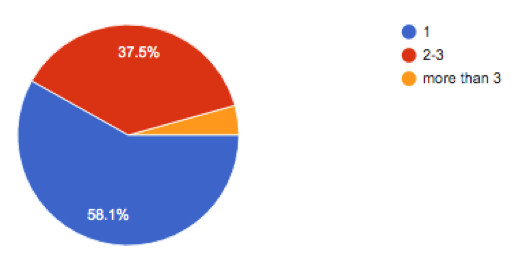
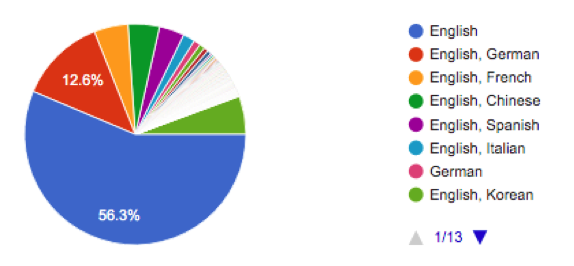
What language classes do you prefer in general, regardless of coronavirus restrictions?
Students were asked which type of classes they preferred regardless of the Covid-19 restrictions (on-line; off-line (face-to-face); or blended). The majority of the respondents selected off-line (40.2%) and blended learning (36.5%) as the most appropriate forms of education; specifying that despite the convenience of online learning “nothing could be better than real communication”. However, an assumption should be made that quite low results for online learning might reflect an overall feeling of fatigue and tiredness caused by the lockdown, and students’ sitting constantly in front of computers and laptops. The results are presented in Figure
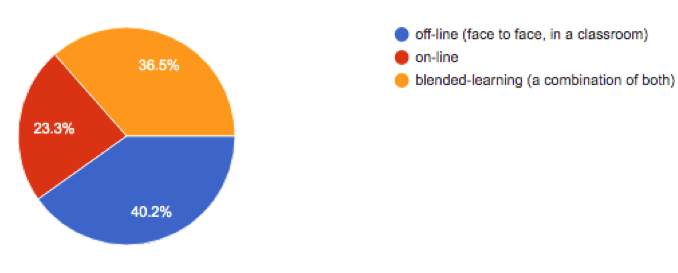
Online Internet services and platforms in distant learning
More than two online educational tools and platforms are commonly used by the respondents for studies (87,6%). The most popular ones are Zoom (90%), Discord (62,2%), Blackboard (54.2%), Quizlet (30%), MS Teams (19%), Kahoot (15%) and Skype (8%). It is worth mentioning that at the end of last year Zoom was used by a few, while Skype was quite popular. Today’s situation is completely different. The results are presented in Figure
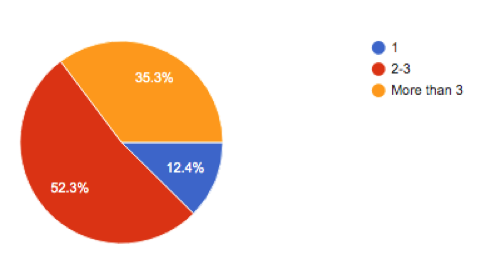

According to the survey, about 50% of the students prefer to use existing IT tools to memorise new words and collocations. These include Quizlet (28%), Kahoot (5.4%), Google Jamboard (2.9%), and other less commonly known applications. As for grammar practising, the most popular tools are Google applications (43.3%) and Kahoot (21.8%). The data are presented in Figures
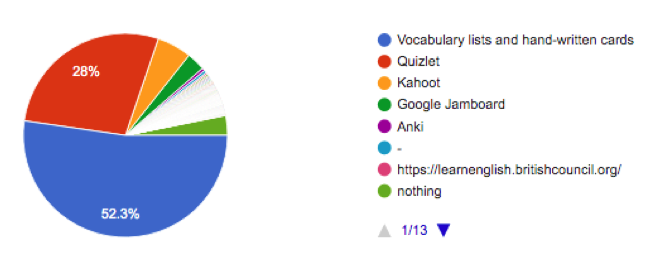
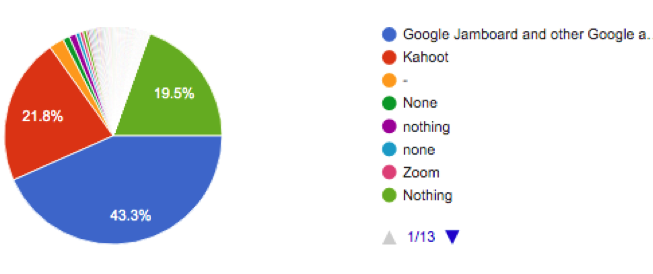
Zoom has been selected as the most effective platform for speaking practise by 77.2% of the respondents. It reflects the present popularity of this online platform.
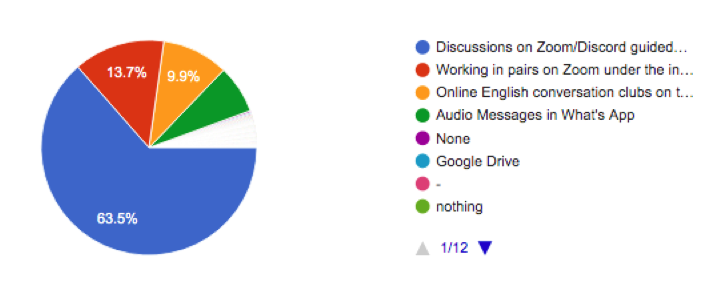
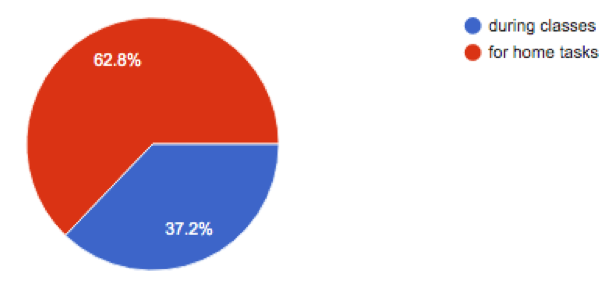

Conclusion
Today, transferable skills such as the ability to communicate successfully in a multinational professional environment, and the use of modern IT to facilitate long-life learning are not less important than professional skills. So, one of the main goals of higher education is to foster the transferable skills of future specialists to ensure their competitiveness in the labour market. The research has shown that we can do it quite effectively teaching ESP. English language for Economics is characterised by some specific features. Those include, first of all, a great number of terms, set phrases, and idioms, which are rather difficult to remember and then to use properly. The situation of forced distance learning for almost a semester has provided a unique opportunity to reveal the students’ preferences. The proposed hypothesis about the effectiveness of the Lexical Approach has been confirmed by the research. The Lexical Approach is implemented effectively using the following digital tools: Quizlet, kahoot.com, and applications for creating Mind Maps. Having analysed the results of the survey, we can state that the students believe modern ESP teaching cannot be effective without using online services, both for classroom work and for homework. However, students prefer to use IT tools for homework as they appreciate real communication both with their mates and with teachers. Thus, blended learning seems the best option.
Acknowledgments
The authors express their gratitude to the staff of the Faculty of Modern Languages of St Petersburg University and the students. Their coordinated and effective actions in difficult conditions made it possible to make such a rapid transition to online teaching of foreign languages, and to conduct such a mass survey.
References
- Atlas of new professions (2014). http://atlas100.ru/about/
- Barcena, E., Timothy, R., & Arus, J. (2014). Languages for Specific Purposes in the Digital Era. Springer International Publishing.
- Beatty, K. (2019). Teaching and Researching: Computer-Assisted Language Learning. Longman.
- Davies, G., Walker, R., Rendall, H., & Hewer, S. (2011). Introduction to Computer Assisted Language Learning (CALL). Module 1.4. In G. Davies (Ed.), Information and Communications Technology for Language Teachers (ICT4LT). Slough, Thames Valley University [Online]. http://www.ict4lt.org/en/en_mod1-4.htm
- Dellar, H., & Walkley, A. (2017). Teaching Lexically: Principles and practice. Delta Publishing
- Erben, T., Ban, R., & Castaneda, M. (2008). Teaching English Language Learners through Technology. Routledge.
- Kakoulli Constantinou, E. (2018). Teaching in Clouds: Using the G Suite for Education for the Delivery of Two English for Academic Purposes Courses. The Journal of Teaching English for Specific and Academic Purposes, 6(2), 305–317. https://doi.org/
- Lewis, M. (1993). The Lexical Approach: The State of ELT and a Way Forward. Language Teaching Publications.
- MacGregor, S. K., & Lou, Y. (2004). “Web-Based Learning: How Task Scaffolding and Web Site Design Support Knowledge Acquisition. Journal of Research on Technology in Education, 37(2), 161-175. https://files.eric.ed.gov/fulltext/EJ690967.pdf
- Macmillan (2020). Little Book of Business Skills. http://www.businessenglishonline.net/business-2/files/2014/11/Little-Book-of-Business-Skills.pdf
- Nazarova, T. B. (2019). Special phraseology in Business English vocabulary: forms and functions. J. Sib. Fed. Univ. Humanit. Soc. Sci.
- Plutino, A. (2017). Teachers as Awakeners: A Collaborative Approach in Language Learning and Social Media. In C. Álvarez-Mayo, A. Gallagher-Brett, & F. Michel (Eds.), Innovative Language Teaching and Learning at University: Enhancing Employability (pp. 115–25). https://doi.org/
- Rosell-Aguilar, F. (2018). Twitter as a Formal and Informal Language Learning Tool : From Potential to Evidence. In F. Rosell-Aguilar, T. Beaven, & M. Fuertes Gutiérrez (Eds.), Innovative Language Teaching and Learning at University: Integrating Informal Learning into Formal Language Education (pp. 99–106). https://research-publishing.net/manuscript?10.14705/rpnet. 2018.22.780
- TexTerra (2020). https://texterra.ru/blog/obzor-15-besplatnykh-programm-dlya-sozdaniya-intellekt-kart.html
- Whitmell, C. (2014). 505 Business Idioms and Phrasal Verbs. Kindle Edition.
- Yate, M. (2017). Knock’em Dead: The Ultimate Job Search Guide. Adams Media
Copyright information

This work is licensed under a Creative Commons Attribution-NonCommercial-NoDerivatives 4.0 International License.
About this article
Publication Date
08 December 2020
Article Doi
eBook ISBN
978-1-80296-096-9
Publisher
European Publisher
Volume
97
Print ISBN (optional)
-
Edition Number
1st Edition
Pages
1-649
Subjects
Linguistics, modern linguistics, translation studies, communication, foreign language teaching, modern teaching methods
Cite this article as:
Rubtsova, S., Dobrova, T., & Gazetdinova, J. (2020). The Lexical Approach In Teaching English For Economics Online. In V. I. Karasik (Ed.), Topical Issues of Linguistics and Teaching Methods in Business and Professional Communication, vol 97. European Proceedings of Social and Behavioural Sciences (pp. 181-189). European Publisher. https://doi.org/10.15405/epsbs.2020.12.02.27

